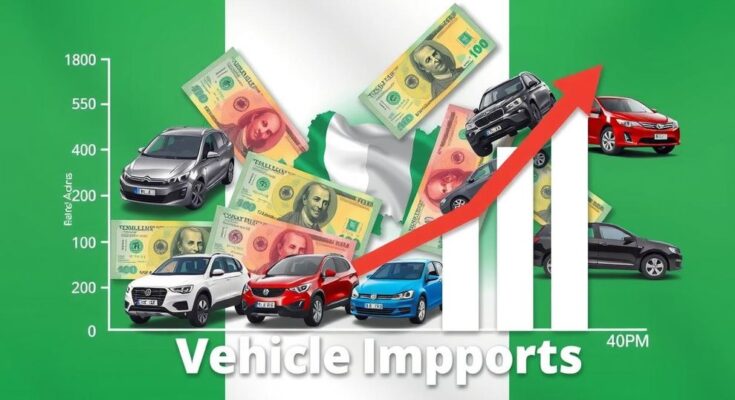Nigeria’s passenger car imports fell 14.2% in 2024 due to volatile exchange rates and soaring inflation. The naira depreciated by 40.9% against the dollar, and customs duties rose sharply, affecting car prices. Many consumers are shifting towards locally made vehicles as the middle class diminishes, indicating a significant change in consumption patterns.
In 2024, Nigeria experienced a notable decline in passenger car imports, with a decrease of 14.2 percent, amounting to N1.26 trillion, down from N1.47 trillion in 2023. This reduction has been largely attributed to fluctuating exchange rates and rising inflation, which have detrimentally affected import activities.
The volatility of the naira is evident as it closed 2024 with a 40.9 percent depreciation against the dollar in the official market, despite a growth in external reserves. The complexities in Nigeria’s currency market indicate ongoing economic challenges, highlighting the impact on importation trends.
According to data from the Central Bank of Nigeria (CBN), the dollar was valued at N1,535 by the end of 2024, a significant drop from N997 per dollar in the previous year. This sharp increase in the dollar’s value poses significant hurdles for importers and businesses reliant on foreign currency.
Kelechi Achilike, a local car dealer, expressed concerns about the soaring dollar rates and customs duties, which have quadrupled. For instance, the customs duty for a Toyota Corolla has increased from approximately N450,000 to N3 million, leading to escalated prices that deter buyers, particularly among middle-class consumers who have largely vanished from the market.
Achilike noted a shift in consumer preference toward locally manufactured vehicles due to their cost-effectiveness compared to imported cars. Nonetheless, some consumers still favor foreign-made vehicles, citing performance and strength as determining factors. Currently, Achilike’s sales have plummeted from nearly ten cars a week to merely two a month, reflecting stark changes in purchasing power and market dynamics.
In conclusion, Nigeria’s passenger car imports have significantly declined in 2024 due to exchange rate depreciation and increasing inflation. The drastic rise in costs related to customs duties and dollar rates has reshaped consumer behavior, with many opting for locally produced cars. The market is now polarized, benefiting wealthier buyers while leaving the middle class largely absent from vehicle purchases, illustrating broader economic issues within the country.
Original Source: businessday.ng




